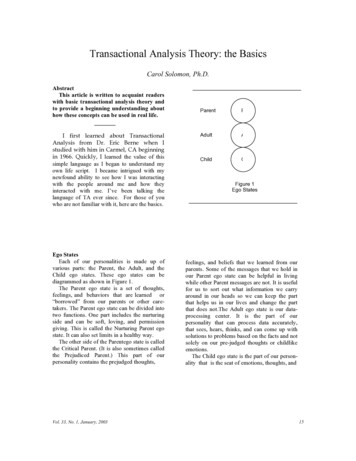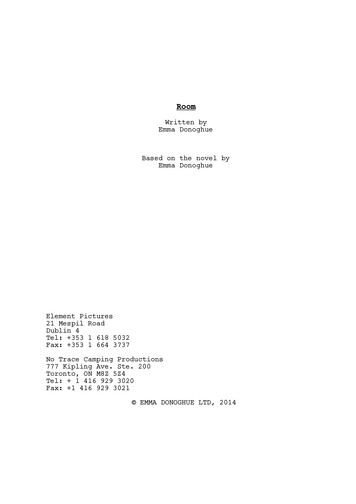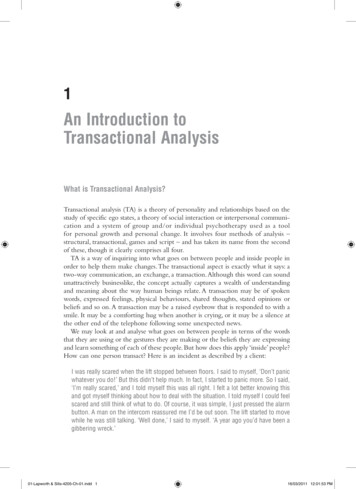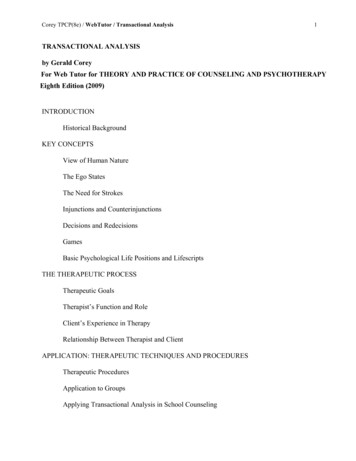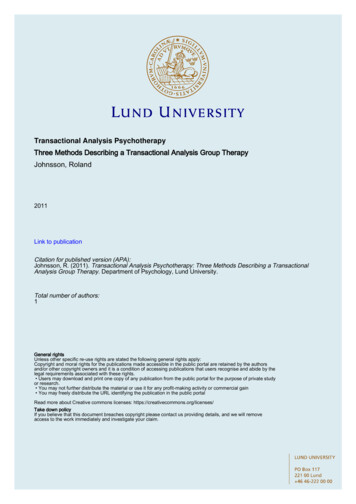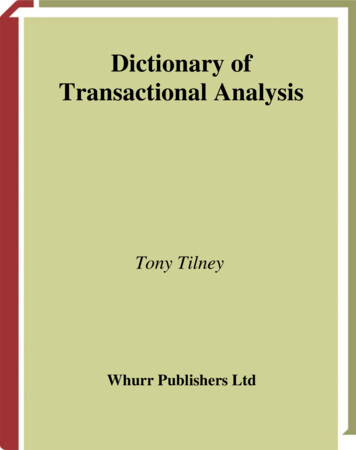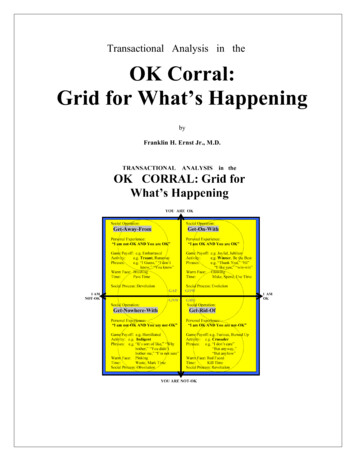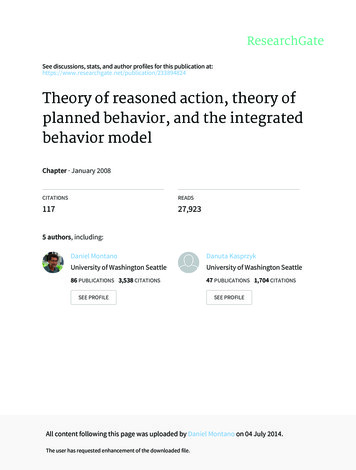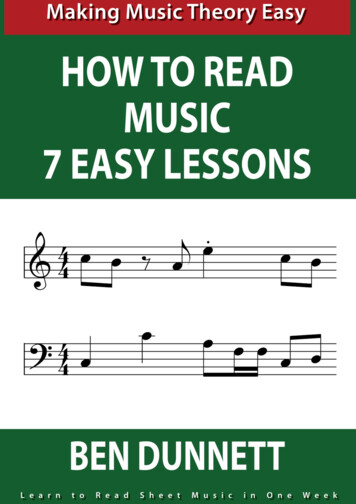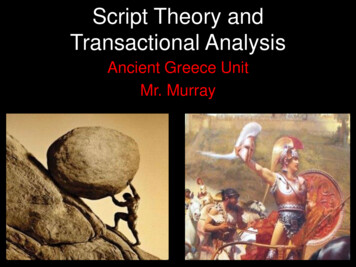
Transcription
Script Theory andTransactional AnalysisAncient Greece UnitMr. Murray
Which is worse? The things that happen to us? or The things that we constantly do toourselves?
Fate vs Free Will--What is the concept of fate?Do you believe in this idea?Why?Who determines your fate?Is there anyway to escape it?What is the concept of free will?Do you believe in this idea?Why?Do you truly have completecontrol over your decisions andyour eventual outcome in life?
Oedipus What are the main events ofSophocles tale? What is the fate of Oedipus? Does Oedipus believe he canescape his fate? Why or whynot? What is the overall message ofOedipus? What does this message tell usabout the Greek concept of fatevs free will?
Greek Concept of Fate The idea of living on past ones life only camefrom ones memories through time or legacy.Immortality was impossibleGods controlled the fortunes or destruction ofman.Fate was an almost unchangeable series ofevents, though one could take multiple paths toreach the end.Fate could only be altered by a trueunderstanding of oneself “Know thyself”In the sense of the unchangeable it is said thatthe different courses of action people take maystill lead to a predetermined destiny.Greeks believed that the gods placed the sins ofthe fathers on their sons.The ongoing battle for the individual in the Greekworld was that of free will versus fate
Is Fate Present In Our Own Lives?
Eric Berne
Parents
Life Scripts You have written your life story. You beganwriting it at birth. By the time you were about four years oldyou had decided on the essential details ofyour plot. At the age of seven you had completedyour story and its main details. From then until you were about twelve,you polish it up and add a few extras hereand there. In adolescence, you revise your storyupdating it with more real life characters. By the time you are 18 years old yourscript is mostly set and can be changed,but only with extreme effort.
Transactional Analysis (TA) and Script entScriptNonWinning
The Script and Life Course– “The script is what the person planned to do inearly childhood and the life course is what actuallyhappens”-Eric Berne
Ego States Everyone has threeego states that arebased on childhood Each ego state isseparate and you onlyfunction in one egostate at any given timeParent: Taught ConceptChild: Felt ConceptAdult: Learned Concept
Excluded Parent People who have excludedparents will go about situationswithout preset rules about theworld around them. They will make up their ownrules for each new situationfaced. Examples of people withexcluded Parent Ego.Some PoliticiansDrug Dealers/Criminals
Excluded Child Someone who excludeschild will block memoriesof his own childhood. When we expressfeelings and emotion asgrownups, we are oftenin our child ego state. A person without a childego state will be cold,wooden, laconic . Allhead no heart.
Excluded Adult If someone excludesadult ego state, theperson blocks their powerof looking at a situationobjectively andcalculating situations. They only hear theirinternal parent to childdialogue. Examples are mostlypeople that are psychotic.
Constant Child They will atmost timesbehave, thinkand feel asthough theywere still inchildhood.Meeting aproblem, thispersonsstrategy willbe to escalatefeelings ormake jokesand light ofthe situation Michael Scottfrom theOffice
Constant Parent A person withconstant parent willdeal with the worldsolely by accessingtheir set of parentalrules Monica Geller fromFriends
Constant Adult A Person withconstant adultis unable tojoin in the fun.Insteadfunctionsalmost solelyas a planner,informationcollector anddataprocessor. SheldonCooper fromBig BangTheory
Ego States: Positive and NegativeNurturingControllingAdaptedFree
Ego State Video Summary https://www.youtube.com/watch?v nKNyFSLJy6o Your turn: With a partner or by yourself comeup with a hypothetical conversation betweentwo people that healthily goes between egostates. Then come up with a conversation thathas a person that excludes parent, child oradult or is in constant parent, child or adult.
Life Positions: I’m Ok, You’re Ok Berne suggested that as a young child formingyour script, you already have certain convictionsabout yourself and others. These convictions are likely to stay with you therest of your life. There are four basic convictions that a child islikely to adhere to:––––I’m Ok orI’m not OkYou are Ok orYou are not Ok
Life Positions By putting together all possible combinations ofchildhood convictions about self and others wecome up with:––––I’m OK, you are OKI’m not Ok, you are OKI’m Ok, you are not OKI’m not OK, you are not OKOne of these life positions makes up a personsfundamental stance of oneself and others around.
Life Positions Once a child has developed a life position, sheis likely to construct all the rest of her script tofit in with it. Berne wrote: “Every game, script and destinyis based on one of these four basic patterns”
I’m Ok, You Are OK A child who chooses thislife position is likely tobuild a winning script. He views himself as lovableand good to have around. He decides that his parentsare lovable andtrustworthy, and laterextends this view to peoplein general.
I’m Not OK, You Are OK If a child adopts this lifeposition he is more likelyto write a banal or losinglife story. To fit with his basicposition he will constructher script round themes ofbeing victimized andlosing out to others.
I’m Ok, You Are Not OK A child who adopts this life position seemson the face of it to build a winning script. But this child will have the conviction thathe needs to be one up and put othersdown. He manages to do this for some of the time,achieving this wants but only with continualstruggle. At other times, the people around him willget tired of being one down and reject him. He will then switch from an apparentwinner to a heavy loser.
I Am Not OK, You Are Not OK The child that adopts this lifeposition is most likely to form alosing script. This child has become convincedthat life is futile and full ofdespair. He vies himself as beingone down and unlovable. He believes no one will help himbecause they are not OK as well.Thus he will write her scriparound scenes of rejecting andbeing rejected.
Life Position In Adulthood Each of us arrives inadulthood havingwritten our scripts basedon one of four lifepositions, but we don’tstay in that positionevery hour of the day. Minute by minute weshift between positions.
I Am OK, You Are OK: Get on with You have just arrived at school and the teachermeets you with a stack of work to do. “Here is what we are doing today” the teachersays “I have marked the pages you have toread and the questions you have to answer.Please turn these items in at the end of class,please?” “Right” you say “I will do that”.– In agreeing with the teachers request I havechecked that I am competent to do the workand feel good about it. I see the teacher as fairand reasonable I asking me to do it.– Each time I have an interaction from thisposition I reinforce my belief that I and othersin the world are OK
I Am Not OK , You are OK: Get AwayFrom You come into class and theteacher gives out a group project.You always have hated groupprojects because you feel like thedumb one in the group. Theleader of the group assigns you atask that you don’t know how tocomplete. Instead of figuring outwhat exactly to do andaccomplishing the task you resortto your child ego state and ask theteacher to go to the bathroom.You spend the next 25 minutes“going to the bathroom”.
I’m OK, You Are Not OK You are working on a groupproject and a fellow groupmate comes to class withouttheir part of the project done.You get super mad and say,“You can’t do anything right,why are you even in ourgroup? I just can’t trustanyone to get the job doneright”. I have just cast off mygroup mate creating ajustification for believing thatI’m Ok while others are not.
I’m Not Ok, You Are Not Ok I am working on a group projectand the subject matter isconfusing and difficult. Mypartners don’t seem to have anybetter grasp than I do on theproject. I get frustrated and say, “Ihave had enough. I can’t take thisany longer and you guys aspartners are no help either. It’shopeless. Look this whole projectis too much to take after the day Ihave had.” In doing so I have justreinforced the I’m not Ok, You arenot Ok life position.
Personal Change and the Ok Corral I am ok, you are ok is the healthy position. I act toachieve winning outcomes I desire when taking thisposition. I am not ok, you are ok is the depressive position.Unknowingly, I will choose my bad feelings andrepetitive behaving to confirm that this is my rightfulposition in the world. I am ok, you are not ok, you are taking the defensiveor paranoid position trying to stay one up on others.Those around me are likely to experience me asoverbearing, insensitive and aggressive. I am not ok, you are not ok, you are taking the futilityposition believing that the world and others are nogood and neither am I. This position will usually getyou nowhere on your life path.
Your Life Positions Think of times in which you have been actingin each of the four life positions. Write downan example of each (you may not have anexample for one or two) Which life position do you seem to leantoward the strongest or is your dominant lifeposition. Explain why you think this is yourdominate position.
Life Script The theory of scrip was developed by EricBerne There are five basics to life scripts:– “Life script is an unconscious life plan.”– Script is directed toward a payoff– Script is reinforced by parents– Script is outside awareness– Reality is redefined to justify the script
Winners, Losers and Non Winners From earliest months, the child istaught not only what to do, butalso what to see, hear, touch,think, and feel.each personobediently ends up at the age offive or six with a script of life planlargely dictated by his parents. It tells him how he's going tocarry on his life, and how it'sgoing to end, winner, non-winner,or loser. That is, the child is giveninformation both aboutthemselves and also about theexternal world (which may befactually correct or incorrect) bythe parent
Winners, Losers and Non Winners For Berne, 'a winner is definedas a person who fulfills hiscontract with the world and withhimself‘ Winners learn to reject thedestructive messages fromhis/her parents child ego state. They use their Adult ego state tore- write their life script, ifneeded, making wise decisionsabout life goals, relationships,time management, values,tolerance of others, selfacceptance and so on.
Winners, Losers and Non Winners A "loser" script has anunhappy ending that doesnot fulfill outcomes desired The person with a loserscript may rationalize thefailures in his/her life byfrequently saying, "If onlysuch and such hadn'thappened," "Someday it willbe better" (but somedaynever comes), "I can't dothat," and so on.
Winners, Losers and Non Winners A non-winner can be referred to asa "happy frog" who never quitebecomes a prince or princess. Berne said the toughest part of hisjob as a therapist was telling peoplethere is no Santa Claus, no magicalsolutions, no free lunch. Non-winners are rationalizers anddeniers, saying, "things will bebetter after.," "things aren't as badas they could be," "things didn'tturn out well, but at least I tried,"etc.
Script Develops Early The notion that people’s adultbehavior and life patterns areaffected by childhoodexperiences is central to TA. Script theory suggests that achild lays down a specific planfor life early in life This life plan is laid out in theform of a drama with a clearcut beginning, middle and end.
Script is Directed Toward a Payoff When a young child writes hislife drama, he writes theclosing scene (Payoff) as anintegral part of it. Parts of the plot, from thestart onwards, are in buildupfor this payoff We are unwittingly choosingbehavior which will bring uscloser to our script payoff.
Script is Decisional A child decides upon the lifeplan. Even different childrenbrought up in sameenvironment may decide uponquite different life plans. The child’s script decisions arenot made in the deliberatethinking way which weassociate with adult decisionmaking.
Script is Reinforced by Parents From a child’s first days, parentsare giving him messages, on thebasis of which he formsconclusions about himself,others and the world. The script messages are verbaland non-verbal. They form the framework inresponse to which the child’smain script decision are made.
Script is Outside Awareness In adult life, the nearest we cometo a memory of our earliest yearsis in dreams and fantasies. Unless we take time to work withand discover our script, we arelikely to remain unaware of theearly decision we made, eventhough we may be living themout in our behavior.
Reality is Redefined to Justify theScript We interpret reality in ourown frame of reference tojustify our script decisions. We do this because in ourchild ego state, we mayperceive any threat to ourscript based view of theworld as a threat to thesatisfaction of our needs oreven a threat to oursurvival.
Discovering Your Own Script Dreams, fantasies, fairy tales, childhood stories,early memories an all give clues to your ownscript. While we go though these exercises let yourimagination run free. Don’t bother thinking whatthey are for or what they may mean. Don’t censor or try to figure what your aresupposed to say Just accept your images and feelings that maycome with them.
E1: Hero or Heroine Who is your favorite character? It may be from a childho
Transactional Analysis (TA) and Script Theory Ego States Life Positions Script Content Script Process Script Winning Non-Winning Losing After Always Almost Open Until Ended Never . The Script and Life Course – The script is what the person planned to do in early childhood and the life course is what actually happens -Eric Berne . Ego States Everyone has three ego states that are based on .
